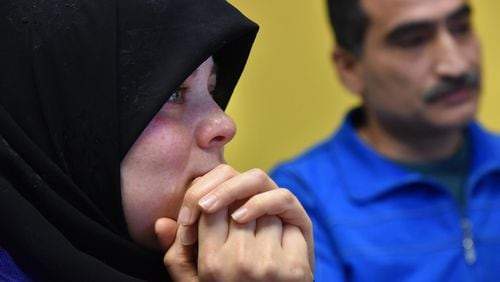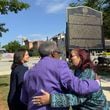Mustafa and Rouda Hammami went to bed every night in Syria dressed as if it were daytime. The winter months were sharply cold as the fighting in their hometown of Aleppo had knocked out the heat in their apartment. But they also wanted to be dressed just right for their own funerals, in case they were bombed while they slept.
The Syrian civil war kept sending the couple signals that it was time to flee. The fighting pulverized much of their town, leaving bodies of women and children in the streets. It ground the family’s real estate business to a halt. They ran out of money. Food became scarce. And his nephew was gunned down.
So they fled to Turkey before arriving with their three children as refugees in Atlanta two months ago. And now the palpable relief they feel for surviving is edged with dread that President Trump is about to shut the door behind them. Her mother and his older brother remain in harm’s way in Syria.
“We were just waiting to die,” Mustafa said Thursday through an Arabic interpreter at the Atlanta office of the International Rescue Committee, which helped resettle his family in Decatur. Objecting to Trump’s plans, Mustafa said he was not a terrorist. “I went from a country of oppression and war to a place just where I can peacefully raise my children.”
On Wednesday, the Republican president signed a pair of executive orders for building a new wall on the southwest border and for cracking down on illegal immigration. Now he is reportedly setting his sights on restricting legal immigration.
Trump, according to multiple press reports, is considering signing executive orders that would block Syrian refugees from coming to the U.S. and cap the number of any refugees who could be resettled here this fiscal year at 50,000, down from the 110,000 ceiling set by the Obama administration. The orders would also halt the resettlement of refugees in the U.S. for four months, giving the government time to evaluate the security screening process. Further, they would block the issuance of visas to any visitors from Syria, Iraq, Iran, Libya, Somalia, Sudan and Yemen.
During his campaign, Trump initially proposed temporarily barring all Muslims from entering the U.S. His focus on Muslims and refugees intensified after the terrorist shootings in San Bernardino, Calif., although they weren’t carried out by refugees. Trump later shifted his focus on restricting access from “terror prone” countries. In an interview with ABC News this week, Trump denied he is attempting to ban Muslims.
“No, it’s not the Muslim ban,” he said. “But it’s countries that have tremendous terror. It’s countries that we’re going to be spelling out in a little while in the same speech. And it’s countries that people are going to come in and cause us tremendous problems. Our country has enough problems without allowing people to come in who, in many cases or in some cases, are looking to do tremendous destruction.”
In the fiscal year ending in September, 3,017 refugees were resettled in Georgia, mostly from Bhutan, the Democratic Republic of Congo, Myanmar and Syria. The issued flared in Georgia last year as Gov. Nathan Deal said he wanted to block Syrian refugees from resettling in the state but was told by the attorney general such a move wasn't legal.
Deal, Trump and other critics worry that Syrians pose a security risk and, following last year’s terror attacks in Paris, called for a halt to their resettlement until screening procedures and background checks were bolstered.
Alarmed by Trump’s plans, a large group of civil rights, immigration and refugee organizations gathered across from the state Capitol in Atlanta Thursday afternoon to condemn them.
“If someone tells you that you are going to be on the menu for dinner, you don’t sit around all day waiting for the cook to get the recipe right, season you and turn the oven on,” said Edward Ahmed Mitchell, executive director of the Council on American-Islamic Relations Georgia Chapter. “You speak up as loudly as you can – as forcefully as you can – to make sure you are not on the menu come nighttime.”
Atlanta Mayor Kasim Reed on Thursday said Atlanta would remain a welcoming community. The city, he said, "has stood up for the civil and human rights of every person, and we will not waver now."
Refugee resettlement agencies in the Atlanta area are particularly on edge, worrying Trump’s plans could wipe out funding. J.D. McCrary, executive director of the International Rescue Committee in Atlanta, said his organization “not only serves new arrival refugees but also other English language learners, youth in and out of school, survivors of trauma, and many others in the community.”
His office is just down the hall from the IRC’s waiting room, where dozens of refugees from around the world were gathering for appointments Thursday afternoon. Around the corner in a small conference room painted a bright yellow, Rouda wept as she recalled fleeing her family’s home in Syria. The family routinely moved around their apartment, searching for the safest places during the daily airstrikes. Their building was destroyed after they headed to Turkey.
The years-long humanitarian crisis in Syria has killed hundreds of thousands of people and displaced millions of others.
“It’s one of the saddest things — one of the hardest things — to leave your own home,” said Rouda, who has expressive pale blue-green eyes.
She and her husband then spent a year going through security screenings in Turkey that involved six interviews, photographs and fingerprints before they were finally allowed to come to the U.S. That process often stretches for more than 12 months, but it was expedited for them because their 15-year-old son has brain cancer.
Now the family is learning English. Their children are dreaming of going to college and studying law and political science. A proud man with a prominent salt-and-pepper mustache, Mustafa is hoping to one day start a new real estate business here. He proudly showed off his new Georgia driver’s license, grinning as if it were a shiny trophy.
“Here there is nothing that is impossible,” he said. “People can do whatever they want as long as they have determination. America is a place where you really can achieve your dreams.”








